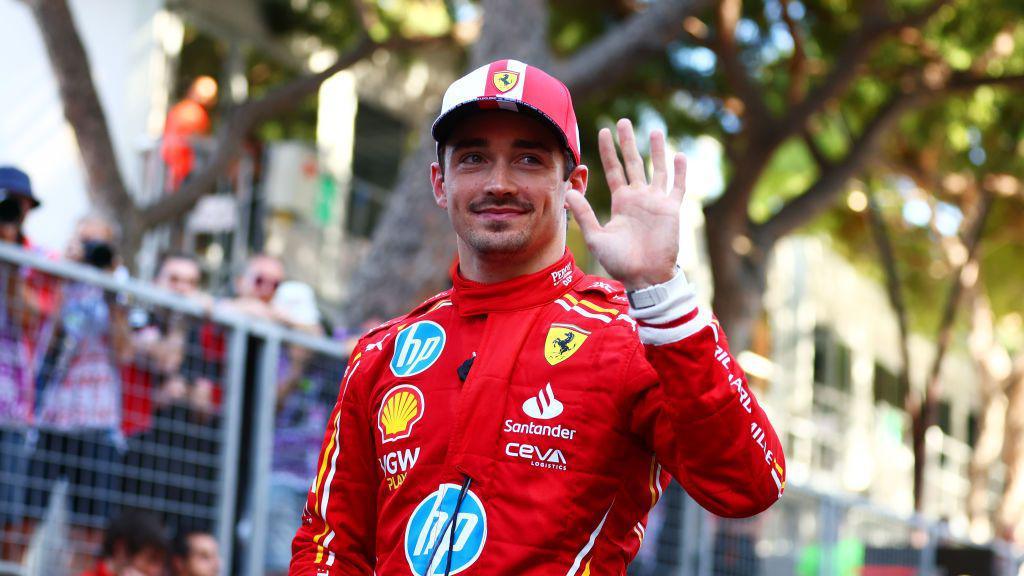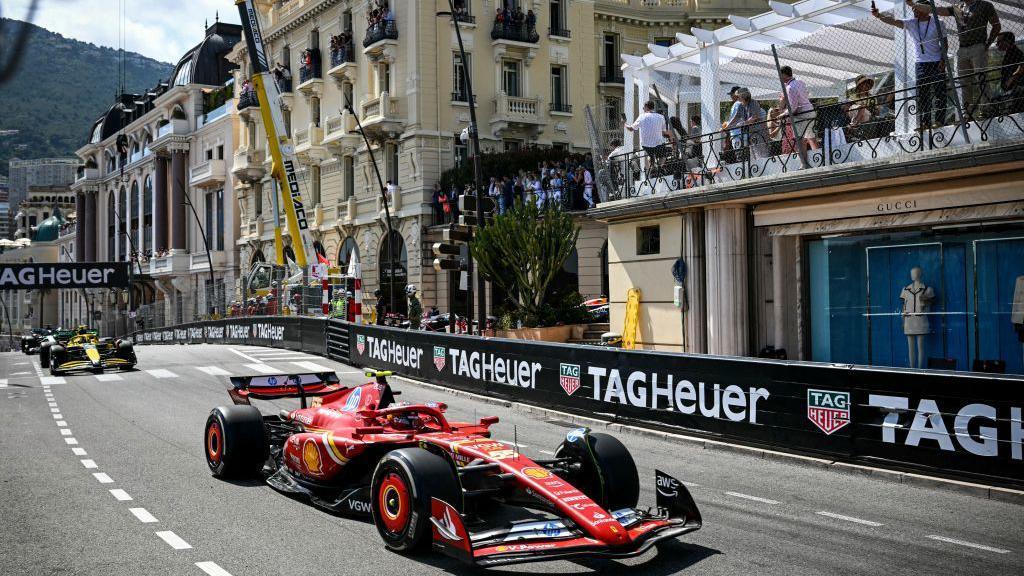Leclerc achieves 'ultimate dream'

Leclerc took his sixth career win in Monaco
- Published
Ferrari driver Charles Leclerc said he had “tears in my eyes” as he was on the verge of completing what he described as “the ultimate dream” and winning the Monaco Grand Prix.
Leclerc has seemed destined to win this race for a long time - but somehow fate stood in his way for a while. As it turned out, it served to make the moment even sweeter when it finally arrived.
Leclerc was born in Monaco. The 26-year-old grew up on the streets on which he drove so consummately through all three days of the event this year. As a child, he watched the race from the balconies of friends whose apartments overlooked the track, and his ambition to become a Formula 1 driver was born.
He lost his father, Herve, to cancer, a year before he first made it to F1. And twice before he had been on pole position in Monaco, which they say in F1 is 90% of the way to winning the race, only for events to tear the grand prix from his grasp.
“My father has done absolutely everything for me to get to where I am today,” Leclerc said. "Our dream was to race and win Monaco in F1. I wouldn’t have imagined when I was younger I would race with Ferrari one day and win this race, and that was obviously the ultimate dream right before becoming world champion.
“I felt like I not only completed my own dream but also the one of my father. And of my mother, who has sustained me in everything I have done since then and who has been an incredibly strong woman when we all lost my dad.”
His family were in the pits, he said, and he had friends watching all around the track. It all added up to a “very, very special feeling”.
Leclerc wins home Monaco GP after heavy Perez crash
- Published26 May 2024
Super yachts and scenery - Monaco shines
- Published26 May 2024
Bending Monaco to his will
Leclerc controlled the race to perfection, using the advantage of the fact that overtaking is pretty much impossible in Monaco to make one set of hard tyres last the entire distance after the race was stopped and then restarted after a first-lap pile-up.
But the feelings almost overwhelmed him at one point.
“I realised actually two laps to the end that I was struggling to see out of the tunnel just because I had tears in my eyes,” Leclerc said. "And I was like: ‘Charles, you cannot do that now. You still have two laps to finish.’
“And especially on a track like Monaco, you have to be on it all the way to the end.
“It was very difficult to contain those emotions, those thoughts again, of the people that have helped me to get to where I am today.
“It's only a win. The season is still very, very long. It's 25 points like any other win. However, emotionally, this one means so much.
“And I think the fact as well that we started twice on pole position in the past and that we couldn't manage to get the win for one reason or another, that we couldn't really control, not in our control, makes this one even more so special.”
Ah, yes, those two lost victories.
The first was in 2021, when he put what was very much not a competitive Ferrari on pole on his first qualifying lap, and then crashed on his second.
Ferrari checked the car over before the race and decided everything was fine - but it wasn’t. They had failed to spot that the driveshaft was cracked and it broke as he left the pits to make his way to the grid.
A year later, he was on pole again. With team-mate Carlos Sainz alongside him, it should have been a slam-dunk, even with a race starting on a wet, but drying, track.
But Ferrari bungled their strategy - as they did a lot that year. And somehow they dropped him from the lead to fourth place.
Redemption - finally
This year, another win beckoned. On arguably the most demanding track on the calendar, Leclerc was sensational all weekend - as he so often is around street circuits.
From the start of Friday practice, he was floating the Ferrari around Monaco, bending car and circuit to his will, lap after lap, like it was the easiest thing in the world.
His rivals were impressed. After Leclerc’s first run in second practice, he set a lap of one minute 11.5 seconds on medium tyres. Lewis Hamilton, second fastest at the time, was a second slower.
When McLaren’s Oscar Piastri, who was to go on to qualify and finish second, returned to the pits after his run, he looked at the timing sheets and asked his team: “Is Leclerc’s time real?” After the session, Max Verstappen said Leclerc was “miles ahead”.
It was no surprise when Leclerc set pole, and from there all he and Ferrari had to do was not mess up. Under new team principal Frederic Vasseur, the strategic fragility has more or less gone, and they delivered.
After the race, many of Leclerc's rivals congratulated him, delighted he had finally achieved a win he has for so long so richly deserved.
“As much as we are competitors,” Leclerc said, "we sometimes feel sorry for each other, and a few of them repeatedly told me how sorry they felt for the two missed occasions in the past and they are happy for me today, which is great to see. It means a lot.”

Ferrari's car is finally starting to compete at the top at some street circuits
A revived Ferrari challenge?
This was the second Ferrari win in seven races this year, after Sainz’s victory in Australia in March. After a difficult weekend for Red Bull, whose car simply would not work over the bumps and kerbs of Monaco, Leclerc has reduced Max Verstappen’s advantage in the championship from 48 to 31 points.
Red Bull suffered from the same problem they had in Singapore last year, when Verstappen also struggled in a similar way. It seems that the car is optimised to work best at a low front ride-height, and in combination with a stiff suspension, it is a characteristic that makes it particularly unsuited to street circuits.
The Ferrari, by contrast, has been designed to work naturally with a higher front ride-height. This gives two advantages.
First, in low-speed corners, an F1 car naturally has a higher ride-height, so Ferrari will have an automatic advantage there because the car is running closer to its natural sweet spot, so the aerodynamic downforce does not deplete as the car rises.
Secondly, because they can afford to let the car run higher and still be fast, the suspension can also be softer, giving a benefit for kerb - and bump - riding.
This is probably the explanation for why Ferrari have been so strong at street circuits with bumps recently - in Las Vegas last year, Melbourne this year and now Monaco. And why Red Bull have comparatively struggled.
As Verstappen said this weekend: “We've had this problem since 2022. For the last two years, I think we had a car advantage. So then it gets masked a little bit because we gain in the corners where the kerbs and the bumps are not that much of a limitation.
“But with everybody closing up, which is the reality, then you cannot hide any more and you get found out, and that’s what happened this weekend. All the street circuits where it is very bumpy we will struggle.”
But of course not all tracks are like that, and there will be others where Red Bull’s natural attributes shine through again. Which is why Leclerc has been counselling caution since before the Monaco weekend got under way.
“I hope that this will bring us to many more wins,” Leclerc said. “But we shouldn't get carried away.
“I don't think about the championship for now anyway, and it's still too early on in the season. I think the upgrades that we have brought [at the last race] in Imola, we have still to see how well they work and where it will bring us. And then it's all about maximising all weekends, and then hopefully, little by little, we'll get there.”